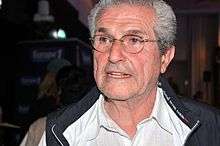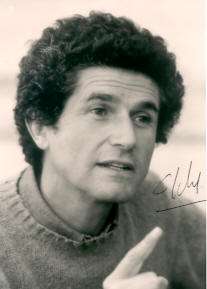Claude Lelouch
| Claude Lelouch | |
|---|---|
 Claude Lelouch at the 2012 Cannes Film Festival | |
| Born |
Claude Barruck Joseph Lelouch 30 October 1937 Paris, France |
| Occupation | Film director, screenwriter, cinematographer, actor, film producer |
| Spouse(s) |
Christine (1970–?) Évelyne Bouix (1980–1985) Marie Sophie (1986–1992) Alessandra Martines (1993–2009) |
| Children | 5 |
| Signature | |
|
| |
Claude Barruck Joseph Lelouch (French: [ləluʃ]; born 30 October 1937) is a French film director, writer, cinematographer, actor and producer.
Life and career
Lelouch was born in the 9th arrondissement of Paris, the son of Charlotte (née Abeilard) and Simon Lelouch.[1] His father was born to an Algerian Jewish family and his mother was a convert to Judaism.[2][3] His father gave him a camera to give him a fresh start after his failure in the baccalaureat. He started his career with reportage - one of the first to film daily life in the U.S.S.R., the camera hidden under his coat as he made his personal journey. He also filmed sporting events like the 24 Hours of Le Mans and the Tour de France.
His first full-length film as director, Le Propre de l'homme, was decried by the critics - 'Claude Lelouch, remember this name well, because you will not hear it again' - Cahiers du cinéma said. La femme spectacle (1963), following prostitutes, women shopping, going for nose-jobs, was censored for its misogynist tendency. A Man and a Woman changed his fortunes and was met with favour even by the Cahiers group. Legend has it that Lelouch found himself one morning on the beach at Deauville when he caught sight of a young woman and her child on the sand. He thought about her story, tried to put together the story of how she had arrived at that moment. The scenario for the film was born. Lelouch set in place here some of the techniques of his filming he will use all his career. He used the locations for decor (here, the Grand Hotel at Deauville), recycled images from his old films (here, the 24 Hours of Le Mans), and used product placement as a means of financing his work (here, Jean-Louis Trintignant and his Ford Mustang.)

The 1981 musical epic Les Uns et les Autres is widely considered as his masterpiece, and his credits now add up to 50 or so films.
Lelouch is known for making movies based heavily on improvised dialogue.
His 1976 film, C'était un rendez-vous, purportedly features a Ferrari 275 GTB being driven at extreme speed through the streets of Paris at dawn. The entire short is shot from the point of view of the car. Legend has it that Lelouch was arrested after it was first shown publicly.[4] In a 2006 interview, the director stated that he drove his own Mercedes-Benz 450SEL 6.9 in the film and created a soundtrack of the radically different sounding Italian sports car for effect.[5]
In recent years the public and the critics have seemed less interested in the director. The first part of his intended trilogy ' Le Genre Humain', Les Parisiens was described in Paris Match as one of the most resounding flops of French cinema. Perhaps a director like Cedric Klapisch had replaced him in the hearts of the younger generation? Lelouch responded, 'It's true no doubt, my public has grown old. It stays home and watches television.'
He has collaborated on no fewer than 28 occasions with the composer Francis Lai. They scored a great hit with the piece 'chabadabada' for the film A Man and a Woman sung by Nicole Croisille and Pierre Barouh, and more than 300 versions of the song exist.
He is the father of 7 children, with 5 women: Simon (born 20 May 1969), Sarah (born 7 June 1976), Salomé Lelouch (born 25 June 1983), daughter Sabaya (born 26 August 1987), son Sachka (born 13 September 1989), daughter Shaya (born 1992) and Stella. He recently separated from wife Alessandra Martines, mother of his youngest daughter, Stella.
In 1993 he was the President of the Jury at the 18th Moscow International Film Festival.[6]
Awards
Lelouch's A Man and a Woman won the Palme d'Or at the 1966 Cannes Film Festival,[7] as well as two Oscars including Best Foreign Language Film.[8] His 1967 film Vivre pour vivre was also nominated for the Best Foreign Language Film Oscar.[9]
In 1971, he won the David di Donatello for Best Foreign Directing for Le Voyou.
Filmography

- Le Propre de l'homme (1960)
- L'Amour avec des si (1962)
- La Femme spectacle (1963)
- Une fille et des fusils (1964)
- Les Grands Moments (1965)
- Pour Un Maillot Jaune (1965)
- A Man and a Woman (1966)
- Vivre pour vivre (1967)
- La Vie, l'amour, la mort (1968)
- 13 jours en France (1968)
- Un Homme qui me plaît (1969)
- Le Voyou (1970)
- Smic, Smac, Smoc (1971)
- L'aventure c'est l'aventure (1972)
- La bonne année (1973)
- Visions of Eight (1973)
- Mariage (1974)
- Toute une vie (1974)
- Le Bon et les méchants (1975)
- Le Chat et la souris (1975)
- C'était un rendez-vous (1976)
- Si c'était à refaire (1976)
- Un autre homme, une autre chance (1977)
- Robert et Robert (1978)
- À nous deux (1979)
- Les Uns et les Autres (1981)
- Édith et Marcel (1982)
- Viva la vie (1983)
- Partir, revenir (1984)
- Attention bandits! (1986)
- Un homme et une femme : vingt ans déjà (1986)
- Itinéraire d'un enfant gâté (1988)
- Il y a des jours... et des lunes (1989)
- La Belle Histoire (1992)
- Tout ça... pour ça ! (1992)
- Les Misérables (1995)
- Lumière et compagnie (1995)
- Hommes, femmes, mode d'emploi (1996)
- Hasards ou coïncidences (1997)
- Une pour toutes (1999)
- And now... Ladies and Gentlemen (2001)
- 11'09"01 September 11 (2002; segment "France")
- Les Parisiens (2004)
- Le Courage d'aimer (2005)
- Roman de Gare (2007; he also appears as "Hervé Picard", a pseudonym)
- Ces amours là (2010)
- D'un film à l'autre (2011)
- Salaud, on t'aime ! (2014)
- Un plus une (2015)
References
- ↑ "Claude Lelouch Biography (1937-)". Filmreference.com. 1937-10-30. Retrieved 2011-11-14.
- ↑ Joseph Tolédano, Les Juifs maghrébins, Brepols, 1989, p.287
- ↑ "Claude Lelouch: Life as a movie - Israel Culture, Ynetnews". Ynetnews.com. 1995-06-20. Retrieved 2011-11-14.
- ↑ http://www.thespinningimage.co.uk/cultfilms/displaycultfilm.asp?reviewid=849
- ↑ IMDB entry
- ↑ "18th Moscow International Film Festival (1993)". MIFF. Retrieved 2013-03-09.
- ↑ "Festival de Cannes: A Man and a Woman". festival-cannes.com. Retrieved 2009-03-07.
- ↑ "The 39th Academy Awards (1967) Nominees and Winners". oscars.org. Retrieved 2011-11-09.
- ↑ "The 40th Academy Awards (1968) Nominees and Winners". oscars.org. Retrieved 2011-11-12.
External links
 Media related to Claude Lelouch at Wikimedia Commons
Media related to Claude Lelouch at Wikimedia Commons- Claude Lelouch at the Internet Movie Database
| ||||||||||||||
| ||||||||||||||||||
| ||||||||||||||||||||||
|